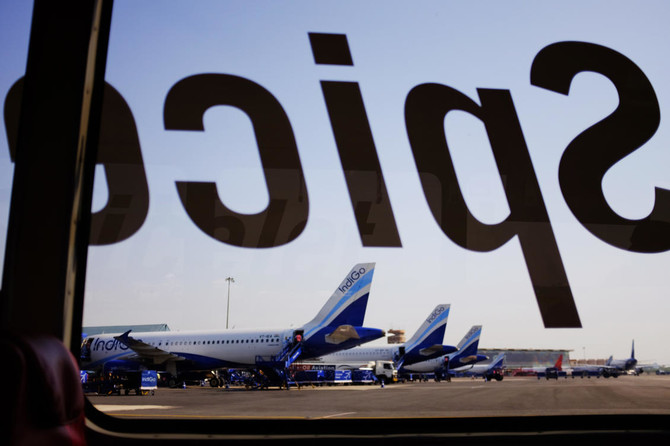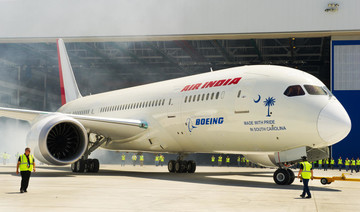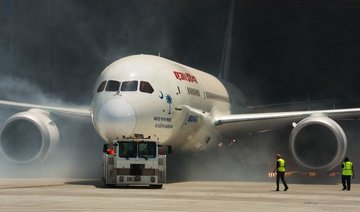NEW DELHI/SINGAPORE: Indian airlines are turning to the international market in search of better returns as the intensifying fight for a bigger share of the world’s fastest growing domestic market — where price is king — drives down profits.
While global airlines’ profits have been strong since 2015 — though with wide regional variations — Indian carriers are struggling to remain profitable, despite filling nearly 90 percent of their seats and benefiting from a more than doubling of domestic passenger numbers over the last four years.
“It is an incredibly tough domestic market, very price sensitive,” said Stephen Barnes, chief financial officer of Singapore Airlines, which operates an Indian carrier, Vistara, in a joint venture with the Tata Group.
“Commanding a premium for a premium product is hard to do. From our perspective we invested in order to see the business grow internationally. If you look at the results of Indian airlines their performance is better internationally.”
Promotions such as $50 one-way tickets on the two-hour flight from Mumbai to Delhi are easy to find and, with airlines expected to take delivery of more than 500 aircraft over the next five years, pressure on fares and profits is increasing.
India is one of the cheapest domestic airline markets in the world, with an average fare of 13 cents per kilometer flown, according to data from travel firm Rome2Rio, less than half the 27 cents per km average in China and the United States.
Airlines including Vistara, SpiceJet Ltd. and InterGlobe Aviation Ltd’s IndiGo are in talks to buy or lease widebody aircraft as they firm up international growth plans to boost profitability.
There is huge potential for international travel from India, where the domestic aviation market has grown about 20 percent annually in recent years.
Only 0.3 percent of the 1.3 billion population currently travel abroad for a holiday every year, a fraction of the estimated 100 million Indians who could potentially afford to do so, according to an analysis of household income by aviation consultancy, CAPA.
The international market is dominated by foreign carriers but the market share of Indian airlines including Air India and Jet Airways has been climbing, helped by policies that limit access by foreign carriers, and reached about 38 percent in 2017, up from 31 percent a decade earlier.
Foreign airlines such as Emirates and Hong Kong’s Cathay Pacific Airways have reached the limit of flights into India allowed under bilateral agreements and New Delhi has not extended additional rights, creating an opening for domestic carriers to grow, said Binit Somaia, director for South Asia at CAPA.
“Demand is there, income levels are rising and people want to travel internationally,” he said.
Jet Airways is considering launching new flights from Mumbai to Sydney, two sources with knowledge of the matter said, while Vistara is planning to order six Boeing Co. 787 aircraft and will expand its narrowbody fleet of Airbus A320neos as it starts international flights, sources have said.
A Jet Airways spokesman said the airline “continuously reviews its fleet and network plan ... to realize greater synergy with its business strategy.”
In the domestic market, which provides crucial connections for international flights, airlines have been jockeying for position at a time when one-time leader Air India has been losing market share to rivals with far lower costs, such as IndiGo.
The Indian government last month failed to attract a single bidder by the deadline for its 76 percent stake sale in the loss-making national carrier.
Revenue per available seat kilometer, a measure combining airfares and seats filled, has been falling at Indian airlines due to stiff competition at a time when the oil price has risen nearly 50 percent in the last year.
IndiGo last month reported a steep fall in quarterly profit due to higher fuel prices and continued pressure on yields, a proxy for airfares.
IndiGo has lifted the proportion of its capacity dedicated to international flights to 15 percent, from 11 percent, in the last year and is seeking regulatory approvals needed to operate long-haul flights, Rahul Bhatia, the company’s chairman, said during an analyst call.
SpiceJet is the only listed Indian airline to post a profit for the last 13 quarters consecutively.
Analysts say it has achieved this by maximizing its aircraft utilization and also flying less competitive routes where it can have a better control over fares, helping protect yields.
Even so, it plans to expand its international flights as it starts taking delivery of its Boeing 737 MAX aircraft from August. The planes, which have a range of six hours and can reach destinations such as Singapore, Hong Kong and Bangkok, will mainly be deployed on international routes.
Infrastructure constraints at major Indian airports like Mumbai and Delhi, where daytime slots are hard to get, also make going international a better option as airlines can utilize night-time slots, a SpiceJet official said.
“International is the only way out,” the official said.
India airlines spread their wings to escape airfare war at home
India airlines spread their wings to escape airfare war at home

- India is one of the cheapest domestic airline markets in the world, with an average fare of 13 cents per kilometer flown
- The Indian government last month failed to attract a single bidder by the deadline for its 76 percent stake sale in the loss-making national carrier Air India
Open Forum Riyadh to discuss digital currency, AI, and mental health

- The event will run in parallel to the WEF’s Special Meeting on Global Collaboration
LONDON: The Open Forum Riyadh — a series of public sessions taking place in the Saudi capital on Sunday and Monday — will “spotlight global challenges and opportunities,” according to the organizers.
The event, a collaboration between the World Economic Forum and the Saudi Ministry of Economy and Planning, will run in parallel to the WEF’s Special Meeting on Global Collaboration, Growth and Energy for Development, taking place in Riyadh on April 28 and 29.
“Under Saudi Vision 2030, Riyadh has become a global capital for thought leadership, action and solutions, fostering the exchange of knowledge and innovative ideas,” Faisal F. Alibrahim, Saudi minister of economy and planning, said in a press release, adding that this year’s Open Forum being hosted in Riyadh “is a testament to the city’s growing influence and role on the international stage.”
The forum is open to the public and “aims to facilitate dialogue between thought leaders and the broader public on a range of topics, including environmental challenges, mental health, digital currencies, artificial intelligence, the role of the arts in society, modern-day entrepreneurship, and smart cities,” according to a statement.
The agenda includes sessions addressing the impact of digital currencies in the Middle East, the role of culture in public diplomacy, urban development for smart cities, and actions to enhance mental wellbeing worldwide.
The annual Open Forum was established in 2003 with the goal of enabling a broader audience to participate in the activities of the WEF, and has been hosted in several different countries, including Cambodia, India, Jordan and Vietnam.
The panels will feature government officials, artists, civil-society leaders, entrepreneurs, and CEOs of multinationals.
This year’s speakers include Yazeed A. Al-Humied, deputy governor and head of MENA investments at the Saudi Pubic Investment Fund; Princess Reema Bandar Al-Saud, Saudi Arabia’s ambassador to the US; and Princess Beatrice, founder of the Big Change Charitable Trust and a member of the British royal family.
Michele Mischler, head of Swiss public affairs and sustainability at the WEF, said in a press release that the participation of the public in Open Forum sessions “fosters diverse perspectives, enriches global dialogue, and empowers collective solutions for a more inclusive and sustainable future.”
Meituan looks to hire in Saudi Arabia, indicating food delivery expansion

SHANGHAI: Chinese food delivery giant Meituan is seeking to hire staff for at least eight positions based in Riyadh, in a sign it may be looking to Saudi Arabia to further its global expansion ambitions, according to Reuters.
The jobs ads, which is hiring for KeeTa, the brand name Meituan uses for its food delivery operations in Hong Kong, is seeking candidates with expertise in business development, user acquisition, and customer retention, according to posts seen by Reuters on Linkedin and on Middle Eastern jobs site Bayt.com.
Meituan did not immediately respond to a request for comment by Reuters on its plans for Saudi expansion.
Bloomberg reported earlier on Friday that the Beijing-based firm would make its Middle East debut with Riyadh as the first stop.
Since expanding to Hong Kong in May 2023, Meituan’s first foray outside of mainland China, speculation has persisted that its overseas march would continue as the firm searches for growth opportunities, with the Middle East rumored since last year to be one area of possible expansion.
“We are actively evaluating opportunities in other markets,“ Meituan CEO Wang Xing said during a post-earnings call with analysts last month.
“We have the tech know-how and operational know-how, so we are quietly confident we can enter a new market and find an approach that works for consumers there.”
IMF opens first MENA office in Riyadh

RIYADH: The International Monetary Fund has opened its first office the Middle East and North Africa region in Riyadh.
The office was launched during the Joint Regional Conference on Industrial Policy for Diversification, jointly organized by the IMF and the Ministry of Finance, on April 24.
The new office aims to strengthen capacity building, regional surveillance, and outreach to foster stability, growth, and regional integration, thereby promoting partnerships in the Middle East and beyond, according to the Saudi Press Agency.
Additionally, the office will facilitate closer collaboration between the IMF and regional institutions, governments, and other stakeholders, the SPA report noted, adding that the IMF expressed its appreciation to Saudi Arabia for its financial contribution aimed at enhancing capacity development in its member countries, including fragile states.
Abdoul Aziz Wane, a seasoned IMF director with an extensive understanding of the institution and a broad network of policymakers and academics worldwide, will serve as the first director of the Riyadh office.
Saudi minister to deliver keynote speech at Automechanika Riyadh conference

RIYADH: Saudi Arabia’s Deputy Minister of Investment Transaction Saleh Al-Khabti is set to deliver the keynote speech at a global automotive aftermarket industry conference in Riyadh.
Set to be held from April 30 April to May 2 in the Saudi capital’s International Convention and Exhibition Center, Automechanika Riyadh will welcome more than 340 exhibitors from over 25 countries.
Al-Khabti will make the marquee address on the first day of the event, which will also see participation from Aftab Ahmed, chief advisor for the Automotive Cluster at the National Industrial Development Centre, Ministry of Industry and Mineral Resources.
Saudi Arabia’s automotive sector is undergoing a transformation, with the Kingdom’s Public Investment Fund becoming the major shareholder in US-based electric vehicle manufacturer Lucid, and also striking a deal with Hyundai to collaborate on the construction of a $500 million-manufacturing facility.
Alongside this, Saudi Arabia’s Crown Prince Mohammed bin Salman launched the Kingdom’s first electric vehicle brand in November 2022.
Commenting on the upcoming trade show, Bilal Al-Barmawi, CEO and founder of 1st Arabia Trade Shows & Conferences, said: “It is a great honor for Automechanika Riyadh to be held under the patronage of the Saudi Arabian Ministry of Investment, and we’re grateful for their continued support as the event goes from strength-to-strength.
“The insights and support we’ve already received have been invaluable, and we look forward to continuing this relationship throughout the event and beyond.”
This edition of Automechanika Riyadh will feature seven product focus areas, including parts and components, tyres and batteries, and oils and lubricants.
Accessories and customizing, diagnostics and repairs, and body and paint will also be discussed, as well as care and wash.
Aly Hefny, show manager for Automechanika Riyadh, Messe Frankfurt Middle East, said: “The caliber of speakers confirmed to take part at Automechanika Riyadh is a testament to the event’s growth and prominence within the regional automotive market.
“We have developed a show that goes beyond the norm by providing a platform that supports knowledge sharing and networking while promoting the opportunity to engage with key industry experts and hear the latest developments, trends and innovations changing the dynamics of the automotive sector.”
Aramco-backed S-Oil expects Q2 refining margins to remain steady then trend upward

SEOUL: South Korea’s S-Oil forecast on Friday that second-quarter refining margins will be steady, supported by regular maintenance in the region, then trend upward in tandem with higher demand as the summer season gets underway, according to Reuters.
Over the January-March period, the refiner said it operated the crude distillation units at its 669,000-barrel-per-day oil refinery in the southeastern city of Ulsan at 91.9 percent of capacity, compared with 94 percent in October-December.
S-Oil, whose main shareholder is Saudi Aramco, plans to shut its No. 1 crude distillation unit sometime this year for maintenance, the company said in an earnings presentation, without specifying the time.

















